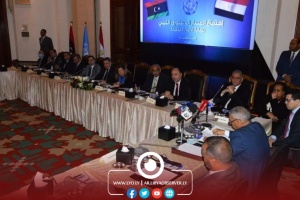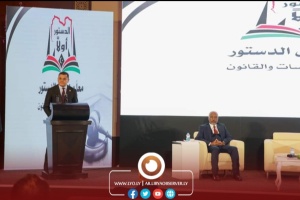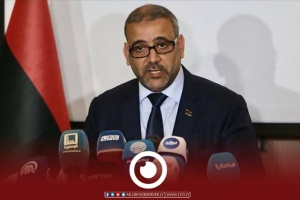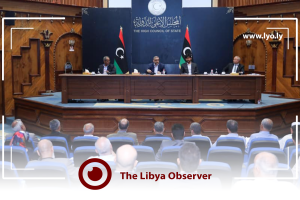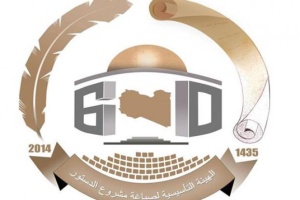Chapter two of the Libyan constitution draft that was approved by the Constituent Assembly on July 29
Libya Constitution – Chapter Two

Chapter Two
Rights and Freedoms
Article 31: Protecting the Right to Life
Every human being shall have the right to life, it shall not be permissible to surrender it and the State shall ensure its protection and take the necessary measures to ensure indemnity [blood money] of the dead when the perpetrator is unknown in accordance with the regulations of the law.
Article 32: The Right to Safety
Every human being has the right to personal, physical, and mental safety. Material gain from a human being and his organs shall not be permissible. The State shall take the necessary measures to compensate victims of calamities for citizens and legal residents.
Article 33: Security and Tranquility
Every human being shall have the right to security and tranquility. The State shall be committed to providing security and tranquility to its citizens and to each resident in its territory.
Article 34: Human Dignity
The State shall be committed to protecting human dignity and preventing all types of violence, torture, inhumane, cruel and humiliating treatment as well as enforced disappearance. The statute of limitations shall not apply to their crimes. All forms of slavery, involuntary servitude, forced labour and human trafficking shall be prohibited, unless out of a necessity or to carry out a punishment according to a court ruling.
Article 35: Sanctity of Private Life
Private life shall enjoy its sanctity. It shall not be permissible to enter private places except for a necessity, and they shall not be searched except in the case of flagrante delicto or with a court warrant. In addition, it shall not be permissible to prejudice personal data, or monitor communications and correspondence except based on the permission of the competent judge.
Article 36: Crimes Against Humanity
All patterns of behavior that constitute crimes against humanity, war crimes, and genocide shall be prohibited. The statute of limitations shall not apply to them, and it shall not be permissible to pardon them in contradiction with the provisions of the Constitution. International jurisdiction of the Libyan judiciary shall apply on them.
Article 37: Freedom of Expression and Publication
Freedom of speech and its integrity shall not be separated. Expression and publication are two safe guarded rights. Necessary measures shall be taken to protect private life and prohibit incitement to hatred, violence, and racism on the basis of ethnicity, colour, language, sex, birth, political opinion, disability, origin, geographic affiliation or any other reasons. Charging with infidelity [Takfir] and imposition of opinion by force shall also be prohibited.
Article 38: Freedom of Press and Media
The State shall guarantee the freedom, plurality, and independence of the press and media. Citizens shall have the right to ownership of press and media outlets. It shall be prohibited to suspend them except by a judicial order and it shall be prohibited to disband them except by a court ruling. Precautionary imprisonment in case of journalism shall not be permissible.
Article 39: Right to Vote and Run as a Candidate
Every citizen shall have the right to vote in referenda as well as to vote or run as a candidate in free, fair, transparent, and equitable elections in which all citizens are equal in accordance with the law. It shall be prohibited to deprive eligible citizen from them except based on a judicial ruling.
Article 40: Freedom to Form Political Parties
Every citizen shall have the right to choose his political leanings. The State shall guarantee the freedom to form political parties based on national unity, transparent financing, renunciation of violence and hate speech. Every citizen shall have the right to join or withdraw from them without discrimination.
Article 41: Civil Society
The State shall guarantee the freedom to form and join civil society organizations according to the standards needed for [creating a] balance between the requirements of their independence and transparency needs. It shall not be permissible to suspend their work except by a judicial order and it shall not be permissible to disband them except by court ruling.
Article 42: Right to Participation
The State shall guarantee for citizens and civil society organizations the right to democratic participation in their realm of activity by submitting petitions or legislative proposals in accordance with a regulatory law issued for this purpose.
Article 43: The Right of Assembly, Association, and Demonstration
The State shall guarantee the right to peaceful assembly, association, and demonstration, and it shall take the necessary measures to protect property and persons. It shall not use force except at a minimum level and in the case of necessity.
Article 44: Right to Movement and Residency
The right to movement and residency, to move property, the freedom to exercise economic activity within the entirety of the country, freedom of travel, and the right to immigration shall be guaranteed to all citizens. A travel ban shall only be by a justified judicial order and for a period defined by the law. It shall be prohibited to deport citizens or prevented them from returning to their homeland. It shall also be prohibited to extradite [citizens] except based on international obligation of an international judicial body.
Article 45: Rights of Libyans Abroad
The State shall take the necessary measures to protect and care for Libyans abroad, ensure their affiliation with their homeland, participation in the electoral process and their contribution to development, as well as follow violation of their rights and extend the jurisdiction of the Libyan judiciary pertaining to these rights.
Article 46: Transparency and Right to Information
The State shall develop the necessary measures for transparency and shall ensure the freedom of receiving, sending, exchanging and perusal of information, as well as multiplicity of its sources in a manner that does not prejudice military secrets, public security secrets, the requirements of the administration of justice, the sanctity of private life and what was agreed upon with another country as secret, with the right to keep the source confidential.
Article 47: Right to Water and Food
The State shall guarantee to citizens the right to safe and adequate drink and food and shall develop the necessary policies to achieve water and food security.
Article 48: Right to Health
Health is a right for every human being and is a duty upon the State and society. The right to live in a sound environment shall be guaranteed to all. The State shall guarantee comprehensive and quality healthcare to all citizens and shall provide preventive services to them. It shall also provide treatment services to them in all stages based on a symbiotic system. It shall ensure the fair geographic distribution of health facilities. Not providing treatment in various forms to any human being in cases of emergency or danger to life shall be prohibited.
Article 49: Supporting Rights of Women
The State shall be committed to supporting and caring for women, laws that ensure their protection, promoting their status in society, eliminating the negative culture and social customs that detract from their dignity, as well as prohibiting discrimination against them, and ensuring their right in public elections and giving them opportunities in all areas; it shall also take the necessary measures to support their acquired rights.
Article 50: Right to Decent Life
1. The State shall guarantee to all citizens decent life and welfare that commensurate with its economic conditions.
2. Social security shall be a right for citizens, and the State shall protect the rights of its residents.
3. Society shall be based on social solidarity, and the State shall guarantee decent life for the needy, including the elderly, orphans, widows and divorcees, in addition to those who do not marry at an early age as well as those who have lost support.
4. The State shall guarantee the rights of the retirees in a manner that ensures that pensions are compatible with legal positions irrespective of the date of retirement.
5. The State shall be committed to providing social care and education for children of unknown parentage so as to ensure their integration in society. The law shall regulate their situations in a manner that achieves this.
At all events, the State shall devise regulations to achieve cooperation and social solidarity among citizens.
Article 51: Intellectual Property
The State shall protect the material and intangible rights of intellectual property in all forms and in all domains, and it shall support it in accordance with what is specified by the law.
Article 52: Right to Education
Education shall be a protected right, which the State shall be committed to promoting and providing to every citizen based on his mental and scientific capacities without discrimination; it shall be compulsory until the age of eighteen and free to citizens in all stages in public education institutions and in accordance with what the law determines for resident foreigners. The State shall support private education and ensure its compliance with its educational policies. The State shall also ensure the inviolability of educational institutions.
Educational curricula shall be based on the standards of quality in accordance with international standards and the teachings and values of the Islamic religion, parameters of Libyan identity, benefiting from human experiences, strengthening the concept of citizenship, social harmony, and peaceful coexistence, as well as teaching human rights and fundamental freedoms.
Article 53: University, Technical and Vocational Education
The State shall take the necessary measures for the independence of universities and research centers and shall guarantee their competitiveness and academic freedom in line with the general national standards. The right to affiliation shall not be restricted except by standards of scientific competence appropriate for the area of specialization.
The state is committed to encouraging and developing technical education as appropriate to the development imperatives.
Article 54: The Priority of Education and Scientific Research
The State shall commit to taking the necessary measures to develop scientific research and provide it with institutional frameworks. It shall ensure the rights of researchers, sponsor creativity and innovation. Priority shall be given to the different types and stages of education and to scientific research in the distribution of national income in a progressive manner that is compatible with international standards.
Article 55: Libyan Languages and Cultures
Every person, individually or collectively, shall have the right to use and learn their languages and to participate in cultural life The State shall guarantee the protection of Libyan languages and provide the necessary means to develop teaching and using them in the media. The State shall also guarantee the protection and promotion of local cultures, heritage, traditional knowledge, literature, and arts, and shall disseminate cultural services.
Article 56: Right to Work
Every citizen has the right to work. The state shall work to provide safe and appropriate conditions of work. The worker has the right to choose the type of work and fairness of its terms, along with guaranteeing union rights. The state shall ensure raising the value of work and provide opportunities for job seekers.
Article 57: Sports Practicing
Sports as a hobby or a profession shall be a right for every individual. The State shall take the necessary measures to support it, advance it and encourage investment in it, as well as provide the proper sports installations for the areas according to their needs. It shall ensure the independence of sports bodies as well as the settlement of disputes between them in accordance with international standards.
Article 58: Private Property
Private property shall be safeguarded as a right. No custodianship shall be imposed on private property except by a court ruling and in the cases that are determined by the law. Expropriation shall only happen for public interest with a fair compensation. In cases other than emergency and martial law, compensation shall be in advance. Property shall only be seized by a judicial ruling. General seizure shall be prohibited.
Article 59: Children Rights
The State shall take all measures for children to fully enjoy their rights and protect them from conditions that endanger their interests, education, and growth. The state shall base its legislations and policies on the best interests of the child.
Article 60: Rights of Persons with Disability
The State shall be committed to guaranteeing the health, social, educational, economic, political, sports and entertainment rights of persons with disability on equal footing with others. The State shall customize public and private facilities and surrounding environment that enable them to integrate into society in a complete and effective manner. The State shall take the necessary measures to activate the laws that guarantees that.
Article 61: Right to Litigation
The right to litigation shall be guaranteed for all. Every person shall have the right to a fair trial before his natural judge and within a reasonable period in which all guarantees shall be provided. No legislation shall be immune from appeal and no conduct detrimental or threatening to rights and freedoms may be excluded from judicial jurisdiction.
Article 62: Principle of Criminal Legitimacy and Assumption of Innocence
Principle of Criminal Legitimacy and Assumption of Innocence Crimes shall be classified into felonies, misdemeanors, and infringements. There shall be no felony or misdemeanor except by law. Infringements shall not be punishable by custodial sentences. Punishment shall be for acts [committed] subsequent to the date on which the law entered into force. The sentence shall be personal and proportionate to the crime and its perpetrator. An accused person shall be innocent until proven guilty.
Article 63: Procedural Guarantees
Every individual shall enjoy respect of human dignity, as his right, in all criminal proceedings. Competent authorities shall justify their orders that affect rights and liberties. There shall be no detention except in places designated for this purpose and for a specific legal period that is proportionate with the accusation, while making this[detention]known to the competent judicial body and the family or chosen person of the detained; his place shall be specified and he shall be given enough time and the necessary facilities to prepare his defense; he shall be informed of his right in not to be forced to submit evidence against himself and his responsibility for any statements he makes, as well as to utilize an interpreter and to choose and contact an attorney. The State shall guarantee judicial assistance.
Article 64: Deprivation of Freedom
Every individual shall have the right to personal freedom. There shall be no deprivation of freedom except in the case of insufficient measures, procedures, or alternative penalties. The state shall be committed to rehabilitating prisoners and integrating them into society. Any person who is deprived of his freedom as a precaution or in implementation of a sentence shall be entitled to proper reparations upon an order that there is no cause for prosecution, based on the regulations of the law.
Article 65: Controls over Restrictions on Exercising Rights and Liberties
Any restriction of rights and liberties must be necessary, clear, defined, and proportionate to the interest to be protected and the characteristics of democratic society. Revoking guarantees provided by the law shall be prohibited. All this shall not contravene with the provisions of this Constitution.
Article 66: Establishment of Legislative and Executive Policies
All legislative and executive policies and development programs shall be based on the protection and promotion of human rights. In this regard, the State shall periodically evaluate its legislation sand policies with subsequent publication of the bases and results of the evaluation in the official newspaper.
To See Chapter One, Please Click Here



